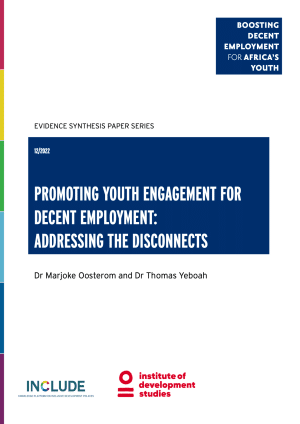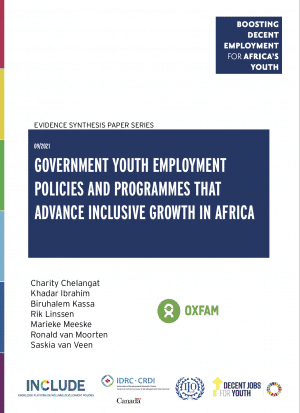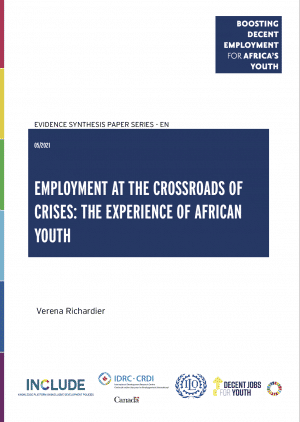
By Joscha Betke
Employment policies and programmes can only be successful if youth are meaningfully and structurally engaged. Strengthening youth engagement has been a key theme for many organizations over the last few years. Government institutions are also increasingly becoming aware of the need to engage youth for creating decent employment opportunities. Nevertheless, important disconnects persists. Strategic long-term partnerships, better coordination between political actors, as well as more inclusive private sector are among key strategies for meaningful youth engagement.
These are key recommendations presented during the webinar “Addressing the Disconnects: Promoting Youth Engagement for Decent Employment” that took place on 13 December 2022. The webinar was organised by INCLUDE and Youth Employment Funders Group (YEFG), with the support of Restless Development, the Institute of Development Studies (IDS), Citi Foundation and the Dutch Ministry of Foreign Affairs. In an interactive conversation between youth representatives and panellists from IDS and Restless Development, the webinar explored:
- Key recommendations on promoting youth engagement within the policy landscape from the new evidence synthesis paper prepared for INCLUDE by IDS in the frame of the ‘Boosting Decent Employment for Africa’s Youth’ partnership (by Dr. Marjoke Oosterom – research fellow at IDS, University of Sussex – and Dr. Thomas Yeboah – research fellow with the Kwame Nkrumah University of Science and Technology, Ghana)
- Lessons learnt from Restless Development’s youth engagement portfolio and its Meaningful Youth Engagement Lab (by Restless Development’s Head of Resource Mobilisation in Tanzania – Farida Makame).
The key policy question for the debate was put forward in the opening remarks by the new Ambassador for Youth, Education and Employment at the Dutch Ministry of Foreign Affairs – Jurriaan Middelhoff: how can policymakers and programmers more meaningfully and structurally engage with youth for better employment outcomes? This question is particularly important for the Dutch Ministry in their activities in Africa, where work and income for youth is one of the most urgent policy challenges, and therefore is a key issue in the new Dutch Policy on Foreign Trade and Development. The Netherlands’ Youth at heart strategy sees meaningful youth engagement as structural interactions between policymakers and youth and recognises youth as partners.
Three key messages to meaningfully engage youth in youth employment policy and practice could be distilled from the webinar discussion between the panellists and youth discussants: Joshua Alade, Executive Director of Nigerian Youth SDGs Network; Rahma Seleman Jumanne, Partnership and Training Coordinator at Youth Challenge International Tanzania; and Dr. Kwasi Owusu Poku, Executive Director of Youth Development, Research and Innovation Centre in Ghana.
1. Strategic alliances can overcome tokenism and adult-initiated youth engagement.
- Broaden strategic partnerships beyond CSOs, including unions or the media, in order to amplify youth’s voices. Also, work across different policy spaces besides national youth authorities.
- Seek strategic alliances with other civil society actors, for instance with women organisations around gender inequalities in the workspace and workplace sexual harassment, and with informal trader associations to defend the rights of young people working in the informal economy.
- Establish sustainable long-term partnerships that make youth feel comfortable. Therefore, provide organisations with flexible funding for capacity building to address the lack of technical know-how on the part of youth civil society for different policy processes.
2. Policy change is a coordination challenge.
- Youth engagement is very limited in national policy formulation, in particular with respect to other policies that matter for decent youth employment, such as labour policies, SMEs, trade and commerce, and agricultural policies.
- National youth authorities must recognise their mandate (to engage young people) and need to improve coordination between the different actors. However, they often focus on implementation, which results in competing with CSOs and development partners.
- Policy influencing is easier to do together with donors/funders and NGOs. Preconditions are clear and transparent accountability and reporting mechanisms between policymakers and youth constituencies.
3. The private sector needs to step up.
- Youth employment in Africa is driven by the private sector but critical disconnects persist: Most youth employment is informally organized, and young women face the risk of vulnerable employment when workplace safety is not addressed. This could be done when ‘matching’ and working directly with firms.
- Companies can become champions for youth participation through bilateral relationships between embassies and other actors. However, they need to be more inclusive and open to youth’s diversity by implementing protective measures for the most vulnerable, e.g. to protect from sexual exploitation.
- Integrate strategies for building young people’s civic and political capacities within funded programmes, which they need to negotiate with employers and develop the confidence to have meaningful voice.
Finally, it is left to say that bringing together these different actors, each speaking from a different perspective, has resulted in an interactive exchange of lessons learnt, best practices and concrete recommendations that served as fruit-for-thought to bring youth engagement practices to a new level of effectiveness. As Philip Fitzgerald – Senior Program Officer at Citi Foundation – emphasized in his closing statement meaningful youth engagement is not a one-size-fits-all solution, it must be tailored to organisations, but a participatory approach is always needed.
If you would like to learn more about practising meaningful youth engagement, please find relevant resources in the box below.
| Additional Resources
|
|
| INCLUDE Knowledge Platform |
|
| Institute of Development Studies (IDS)
|
|
| Restless Development |
|
| Additional resources recommended by participants
|
|


